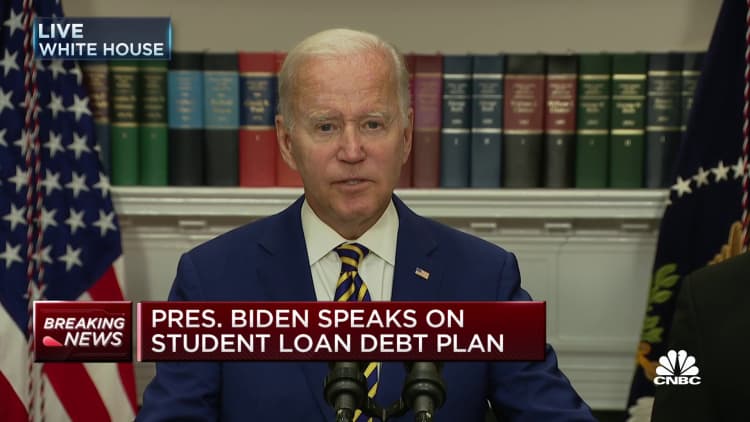Hits: 10
A student walks to class at Rice University in Houston on Aug. 29, 2022.
Brandon Bell | Getty Images News | Getty Images
The application for student loan forgiveness will be ready by early October, the U.S. Department of Education says.
After people apply, they could see the relief within six weeks.
While borrowers wait for the application to launch and for the forgiveness to occur, there’s at least one big move they will likely want to avoid.
“Don’t refinance your federal loans if you expect to receive forgiveness,” said higher education expert Mark Kantrowitz. That’s because private student loans are not eligible for forgiveness, he said.
More from Personal Finance:
Here’s how to combat inflation with Labor Day deals
50% of employers expect job cuts, survey finds
Americans spend $314 a month on impulse purchases
The White House has said that federal student loan borrowers will be eligible for up to $10,000 in student loan forgiveness if they didn’t receive a Pell Grant, which is a type of aid available to low-income undergraduate students, and up to $20,000 if they did. The relief is also limited to those who make less than $125,000 per year, or married couples or heads of households earning less than $250,000.
Even if you owe more than you expect to get forgiven, consumer advocates are wary of the benefits of refinancing your student debt because of the additional protections that come with federal loans.
But there are several other smart moves borrowers ought to take in the days ahead, experts say.

You also don’t want to assume that student loan forgiveness won’t really happen or that you don’t qualify for it, they add. Here’s a look at five steps you can take while you wait.
1. Make sure your contact info is up to date
Although a number of Republican legislators may bring a legal challenge against President Joe Biden’s historic plan, no lawsuit has been filed yet and there’s no way to know how one would unfold. In the meantime, experts are encouraging borrowers to prepare to apply as soon as they’re able.
While waiting for student loan forgiveness, you’ll want to update your contact information with your loan servicer and at StudentAid.gov, Kantrowitz said.
This will make sure you don’t miss any important information and deadlines.
2. Confirm your income qualifies
Nora Carol Photography | Moment | Getty Images
Make sure you qualify to receive the relief. To do this, review your recent tax returns to confirm your income fell below the imposed income caps ($125,000 for individuals and $250,000 for households). The Education Department will be considering people’s so-called adjusted gross income, or AGI, which may be different than your gross salary.
To confirm your AGI for 2020 and 2021, look for line 11 on the front page of your tax return, known as Form 1040.
3. Review your loan details
Most federal student loans qualify for the cancellation. However, there are roughly 5 million borrowers with older student loans, known as commercially held Federal Family Education Loans (FFEL), that are actually held by private companies. (You can check your loan type at Studentaid.gov by signing in with your FSA ID and going to the “My Aid” tab.)
The Education Department says it’s working to make sure that borrowers with commercially held FFEL loans get the forgiveness, too, even though it doesn’t hold the debt. But if you have these loans and want to make sure you’re included in forgiveness sooner rather than later, you may want to consolidate them into the main federal student loan program.
You should also check if you received a Pell Grant to determine whether you’re eligible for the entire $20,000 in cancellation, Kantrowitz said.
4. Watch out for scams
Chris-mueller | Istock | Getty Images
While you wait, be on the lookout for one of the all-too-common student loan scams, said Abby Shafroth, an attorney at the National Consumer Law Center. No one should charge you for applying for forgiveness, and don’t give out any personal information to someone who calls you out of the blue, Shafroth said.
5. Contact your loan servicer with questions
If you have questions for your servicer about the end of the payment pause or forgiveness, reach out sooner rather than later.
In addition to Biden’s announcement on student loan cancellation, he also extended the payment pause on federal student loans until Dec. 31. That was the seventh extension of the pandemic-era relief policy started under the Trump administration and it will likely be the final one.
“Loan servicers are likely to be inundated with questions starting a few days before the deadlines,” Kantrowitz said.
Be the first to comment